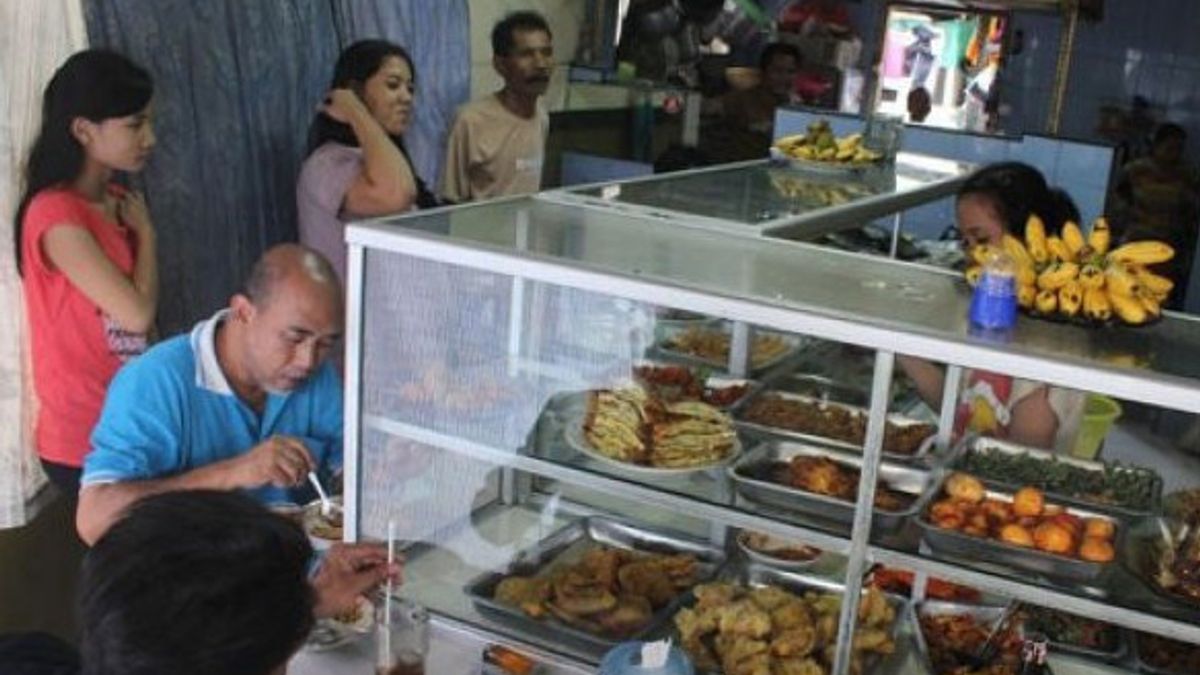JAKARTA - The supply of raw tofu and tempeh has disappeared from the market in recent days. This is the aftermath of the decision of the craftsmen to strike production and trade for three days. As a result, the tofu and tempeh side dishes also disappeared from the Tegal stall (warteg).
The Chief Coordinator of Warteg Nusantara (Kowantara), Mukroni explained that the warteg no longer sells tofu and tempeh menus. This is because warteg entrepreneurs usually do not keep stock of tofu and tempeh for a long time.
"The impact (from the crafters' strike) is that the tofu and tempeh menus are not sold," he said when contacted by VOI, quoted Wednesday, February 23.
Usually, said Mukroni, each warteg sells 10 menus made from tofu and tempeh. For example, tempeh orek, tempeh pare to tofu contents.
"The tofu tempeh is missing, as well as the missing menu at warteg orek tempe, bitter melon, pokcay tempeh, flour fried tempeh, vegetable tofu tempeh, bacem tofu tempeh, intestine tofu, Bandung tofu, chicory tofu, and stuffed tofu," he said.
Tofu and tempeh craftsmen go on strike for three daysThe rising price of imported soybeans as the main raw material for making tofu and tempeh has triggered a strike on the production and trade of tofu and tempeh craftsmen in Java. If the price of soybeans does not decrease, the craftsmen will increase the selling price of tofu and tempeh by 10 to 20 percent in the market.
Chairman of the Association of Indonesian Tofu and Tempe Producers Cooperatives (Gakoptindo) Aip Syaifuddin said that the production and trade strike which will be held on February 21, 22 and 23 is the end of the anxiety experienced by tofu and tempeh craftsmen since December 2021. The unrest stems from the price of soybeans. which is increasing every day.
According to Aip, before deciding to carry out a production strike, his party had implemented various proposals from Gakoptindo members. Among them were complaining to the government, replacing raw materials with local soybeans, which eventually led to a strike.
"At the end of December 2021, soybean prices began to rise and increase every day. So we are restless. So some regions, districts, groups (crafters) how is this, how is it, some have suggested we tell the government, some say look for local soybeans, but nothing. Or we suggest the government help raise the price (tofu and tempeh), or ask for subsidies, at least the last one is a strike," he said when contacted by VOI, Friday, February 18.
"That has been since December 2021. I conveyed the voices of the members to the government, but it turns out that from the government in December, January, now it is mid-February, there is no concrete action on the ground," he continued.
According to Aip, if the strike does not reduce the price of soybeans, the artisans will increase the selling price of tofu and tempeh by 10 to 20 percent in the market.
Therefore, Aip apologized to the people who love tofu and tempeh if the price in the market experienced an increase. He emphasized that the price had to increase because the price of raw materials had increased.
Aip said that currently the average price of soybeans reaches Rp. 11 to Rp. 11,500 per kilogram (Kg) on the island of Java. Meanwhile, the price reaches IDR 12,000 per kg in Aceh, Kalimantan or Sulawesi.
"We, from tofu and tempeh craftsmen, apologize to the people who love tofu tempeh, because this is forced, forced and forced by us. So we apologize," he said.
For example, said Aip, tofu and tempeh prices increased by 10 to 20 percent. Previously, the price of tempeh for a piece of palm or 500 grams was around Rp. 5 thousand to Rp. 6 thousand in the market. Then there will be an increase of 10 or 20 percent. This means that from Rp. 5 thousand, it rose to Rp. 6 thousand.
On the other hand, Aip believes that the government pays little attention to tofu and tempeh craftsmen. This is because the problem of rising prices for raw materials, namely soybeans, continues to occur every year.
"So if you're honest and it's even more true that this increase in soybeans is repeated every year. Last December, before, before it was like this every year. Attention (the government) is still lacking," he said.
"There has been a response. But the solution is not yet clear," he continued.
The English, Chinese, Japanese, Arabic, and French versions are automatically generated by the AI. So there may still be inaccuracies in translating, please always see Indonesian as our main language. (system supported by DigitalSiber.id)











